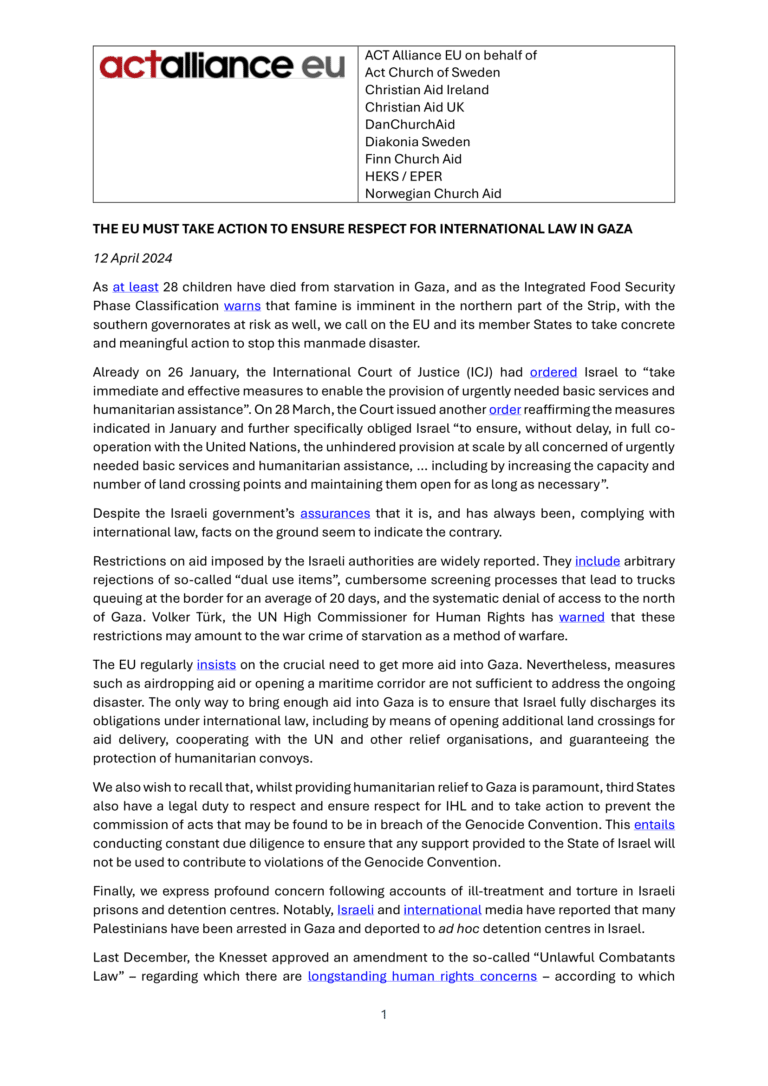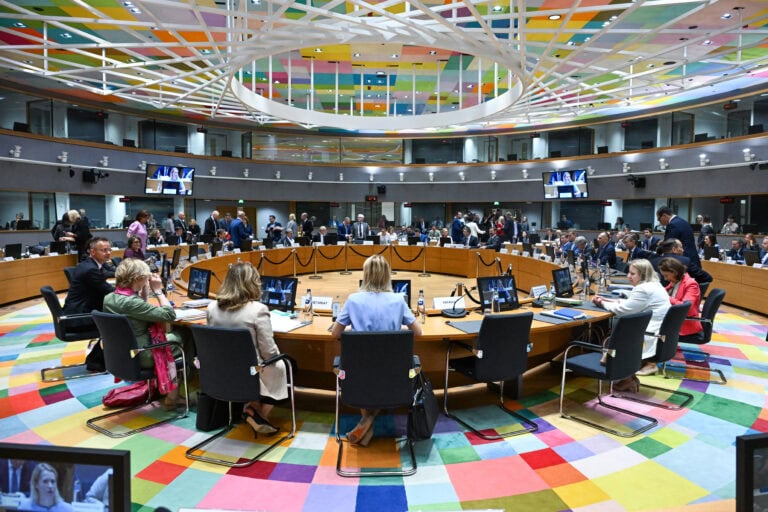ACT Alliance EU, on behalf of its members Act Church of Sweden, Christian Aid Ireland, Christian Aid UK, DanChurchAid, Diakonia Sweden, Finn Church Aid, HEKS / EPER, and Norwegian Church Aid.
As at least 28 children have died from starvation in Gaza, and as the Integrated Food Security Phase Classification warns that famine is imminent in the northern part of the Strip, with the southern governorates at risk as well, we call on the EU and its member States to take concrete and meaningful action to stop this manmade disaster.
Already on 26 January, the International Court of Justice (ICJ) had ordered Israel to “take immediate and effective measures to enable the provision of urgently needed basic services and humanitarian assistance”. On 28 March, the Court issued another order reaffirming the measures indicated in January and further specifically obliged Israel “to ensure, without delay, in full co-operation with the United Nations, the unhindered provision at scale by all concerned of urgently needed basic services and humanitarian assistance, … including by increasing the capacity and number of land crossing points and maintaining them open for as long as necessary”.
Despite the Israeli government’s assurances that it is, and has always been, complying with international law, facts on the ground seem to indicate the contrary.
Restrictions on aid imposed by the Israeli authorities are widely reported. They include arbitrary rejections of so-called “dual use items”, cumbersome screening processes that lead to trucks queuing at the border for an average of 20 days, and the systematic denial of access to the north of Gaza. Volker Türk, the UN High Commissioner for Human Rights has warned that these restrictions may amount to the war crime of starvation as a method of warfare.
The EU regularly insists on the crucial need to get more aid into Gaza. Nevertheless, measures such as airdropping aid or opening a maritime corridor are not sufficient to address the ongoing disaster. The only way to bring enough aid into Gaza is to ensure that Israel fully discharges its obligations under international law, including by means of opening additional land crossings for aid delivery, cooperating with the UN and other relief organisations, and guaranteeing the protection of humanitarian convoys.
We also wish to recall that, whilst providing humanitarian relief to Gaza is paramount, third States also have a legal duty to respect and ensure respect for IHL and to take action to prevent the commission of acts that may be found to be in breach of the Genocide Convention. This entails conducting constant due diligence to ensure that any support provided to the State of Israel will not be used to contribute to violations of the Genocide Convention.
Finally, we express profound concern following accounts of ill-treatment and torture in Israeli prisons and detention centres. Notably, Israeli and international media have reported that many Palestinians have been arrested in Gaza and deported to ad hoc detention centres in Israel.
Last December, the Knesset approved an amendment to the so-called “Unlawful Combatants Law” – regarding which there are longstanding human rights concerns – according to which persons can be detained for up to 45 days without an arrest warrant. Individuals that are identified as suspects in that period will remain in detention whereas others will be deported back to Gaza.
The Israeli military does not disclose the number of detainees currently held in detention centres, and, since 7 October, it has not been allowing the International Committee of the Red Cross (ICRC) to visit these detainees. NGOs have reported that at least 27 Palestinians from Gaza have died in such centres since October.
International law prohibits arbitrary deprivation of liberty as well as the taking of hostages. Torture, cruel, or inhuman treatment as well as outrages upon personal dignity are also absolutely prohibited. We call on the EU and its member States to ensure that both the Israeli government and Hamas comply with all applicable rules of international law, including allowing the ICRC to have access to detainees in detention centres, and to the Israeli hostages held by Hamas. We are profoundly concerned by reports of hostages being held in inhumane conditions and we reiterate our call for their immediate release.
As a network of faith-based development and humanitarian agencies, we strongly reiterate our urgent appeal for an immediate and permanent ceasefire, coupled with the prompt release of all hostages. A comprehensive commitment to peace, humanitarian efforts, and international law is imperative for ending the unfolding catastrophe.
ACT Alliance EU, on behalf of its members Act Church of Sweden, Christian Aid Ireland, Christian Aid UK, DanChurchAid, Diakonia Sweden, Finn Church Aid, HEKS / EPER, and Norwegian Church Aid, calls upon the EU and its Member States as well as relevant European countries outside the EU, to:
- Take all actions possible to ensure that the parties reach an immediate and permanent cessation of hostilities as well as the immediate and unconditional release of all hostages.
- Employ all lawful means at their disposal to ensure that the Government of Israel take concrete and meaningful steps to ensure safe, rapid, and unhindered humanitarian access to all people in need throughout the Gaza Strip.
- Suspend the EU – Israel Association Agreement pending a review of Israel’s compliance with article 2 also known as the “human rights clause”.
- Abide by the UNHRC resolution and suspend all arms transfers to Israel while there is a plausible risk that weapons, parts, and ammunitions may be used for the commission of violations of international law.
You can download a PDF version of our statement here.


